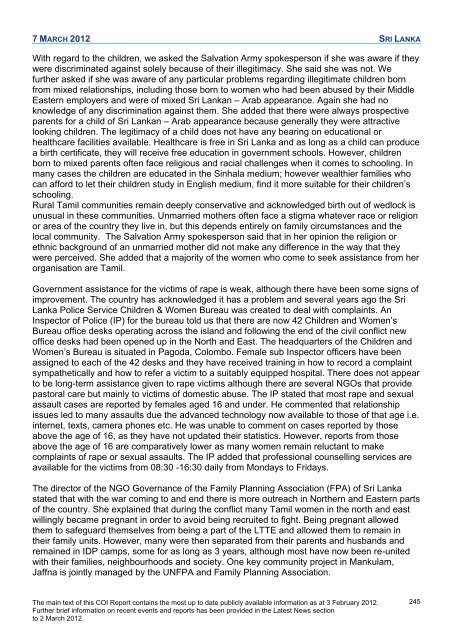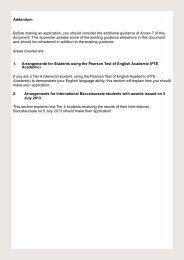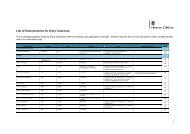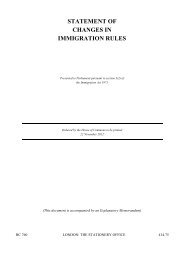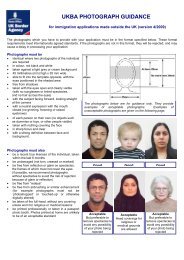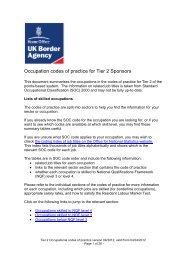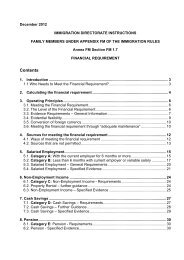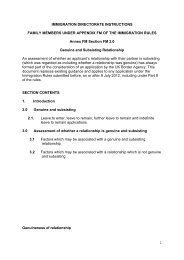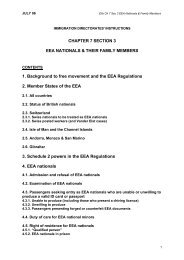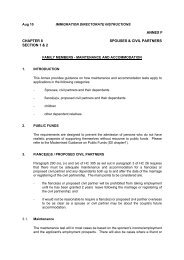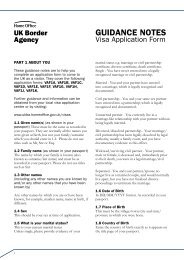COI Report March 2012 - UK Border Agency - Home Office
COI Report March 2012 - UK Border Agency - Home Office
COI Report March 2012 - UK Border Agency - Home Office
Create successful ePaper yourself
Turn your PDF publications into a flip-book with our unique Google optimized e-Paper software.
7 MARCH <strong>2012</strong> SRI LANKA<br />
With regard to the children, we asked the Salvation Army spokesperson if she was aware if they<br />
were discriminated against solely because of their illegitimacy. She said she was not. We<br />
further asked if she was aware of any particular problems regarding illegitimate children born<br />
from mixed relationships, including those born to women who had been abused by their Middle<br />
Eastern employers and were of mixed Sri Lankan – Arab appearance. Again she had no<br />
knowledge of any discrimination against them. She added that there were always prospective<br />
parents for a child of Sri Lankan – Arab appearance because generally they were attractive<br />
looking children. The legitimacy of a child does not have any bearing on educational or<br />
healthcare facilities available. Healthcare is free in Sri Lanka and as long as a child can produce<br />
a birth certificate, they will receive free education in government schools. However, children<br />
born to mixed parents often face religious and racial challenges when it comes to schooling. In<br />
many cases the children are educated in the Sinhala medium; however wealthier families who<br />
can afford to let their children study in English medium, find it more suitable for their children‘s<br />
schooling.<br />
Rural Tamil communities remain deeply conservative and acknowledged birth out of wedlock is<br />
unusual in these communities. Unmarried mothers often face a stigma whatever race or religion<br />
or area of the country they live in, but this depends entirely on family circumstances and the<br />
local community. The Salvation Army spokesperson said that in her opinion the religion or<br />
ethnic background of an unmarried mother did not make any difference in the way that they<br />
were perceived. She added that a majority of the women who come to seek assistance from her<br />
organisation are Tamil.<br />
Government assistance for the victims of rape is weak, although there have been some signs of<br />
improvement. The country has acknowledged it has a problem and several years ago the Sri<br />
Lanka Police Service Children & Women Bureau was created to deal with complaints. An<br />
Inspector of Police (IP) for the bureau told us that there are now 42 Children and Women‘s<br />
Bureau office desks operating across the island and following the end of the civil conflict new<br />
office desks had been opened up in the North and East. The headquarters of the Children and<br />
Women‘s Bureau is situated in Pagoda, Colombo. Female sub Inspector officers have been<br />
assigned to each of the 42 desks and they have received training in how to record a complaint<br />
sympathetically and how to refer a victim to a suitably equipped hospital. There does not appear<br />
to be long-term assistance given to rape victims although there are several NGOs that provide<br />
pastoral care but mainly to victims of domestic abuse. The IP stated that most rape and sexual<br />
assault cases are reported by females aged 16 and under. He commented that relationship<br />
issues led to many assaults due the advanced technology now available to those of that age i.e.<br />
internet, texts, camera phones etc. He was unable to comment on cases reported by those<br />
above the age of 16, as they have not updated their statistics. However, reports from those<br />
above the age of 16 are comparatively lower as many women remain reluctant to make<br />
complaints of rape or sexual assaults. The IP added that professional counselling services are<br />
available for the victims from 08:30 -16:30 daily from Mondays to Fridays.<br />
The director of the NGO Governance of the Family Planning Association (FPA) of Sri Lanka<br />
stated that with the war coming to and end there is more outreach in Northern and Eastern parts<br />
of the country. She explained that during the conflict many Tamil women in the north and east<br />
willingly became pregnant in order to avoid being recruited to fight. Being pregnant allowed<br />
them to safeguard themselves from being a part of the LTTE and allowed them to remain in<br />
their family units. However, many were then separated from their parents and husbands and<br />
remained in IDP camps, some for as long as 3 years, although most have now been re-united<br />
with their families, neighbourhoods and society. One key community project in Mankulam,<br />
Jaffna is jointly managed by the UNFPA and Family Planning Association.<br />
The main text of this <strong>COI</strong> <strong>Report</strong> contains the most up to date publicly available information as at 3 February <strong>2012</strong>.<br />
Further brief information on recent events and reports has been provided in the Latest News section<br />
to 2 <strong>March</strong> <strong>2012</strong>.<br />
245


